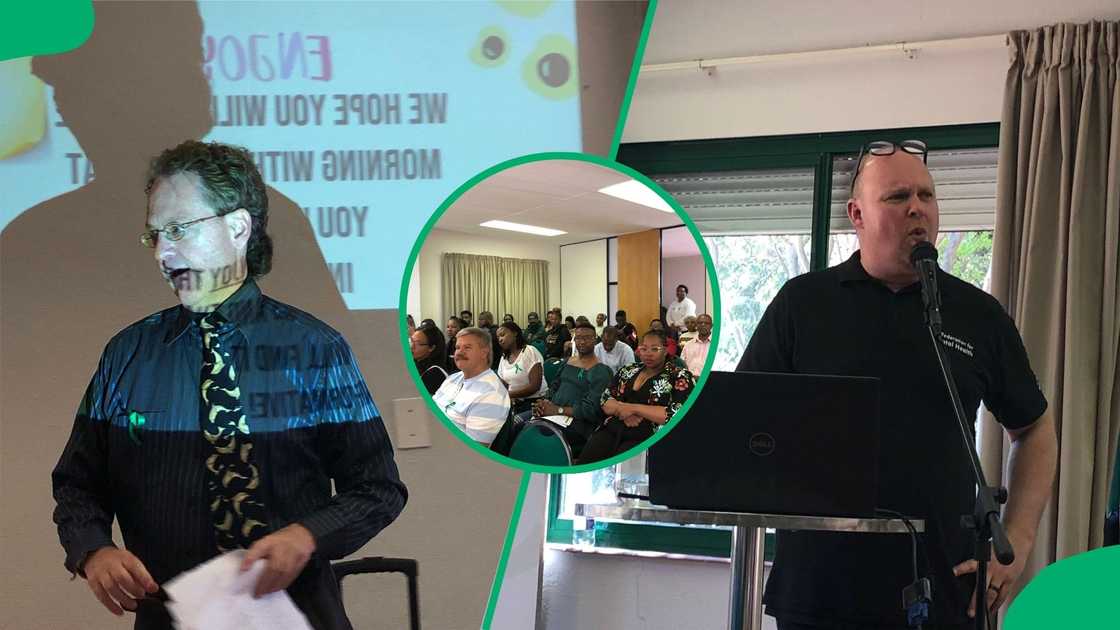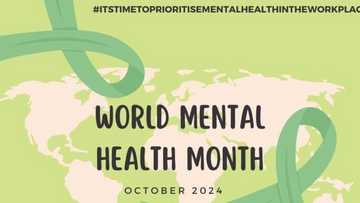“Prioritise It”: Johannesburg NGO Hones In on Workplace Mental Health Amid Global Event Celebrations
- South Africa marked World Mental Health Day with an event in Randburg, Johannesburg, on Thursday, 10 October 2024
- A dialogue invited numerous mental health stakeholders affiliated with the South African Federation for Mental Health
- SA loses about R161 billion per year from the economic impact of mental, neurological, and substance use (MNS) disorders
- Briefly News provided coverage of the event, spotlighting the impact of workplace mental health with exclusive interviews
PAY ATTENTION: Got a Minute? Complete Our Quick Survey About Briefly News!

Source: Original
JOHANNESBURG — World Mental Health Day celebrations were in full swing in South Africa on Thursday, 10 October 2024, marking a significant global event.
Under the theme 'It's time to prioritise mental health in the workplace', a commemorative staging in Randburg highlighted the importance of employee wellness amid glaring World Health Organization (WHO) statistics suggesting a high rate of work-related mental illnesses and their economic impact.

Read also
Is the employer liable for workplace suicide?: Expert weighs in after Standard Bank Employee tragedy
NGO homes in on workplace mental health
Notably, poor working environments, brought on by discrimination, unreasonable workloads and low job control, posed a risk to mental health, with the WHO estimating 15 per cent of working-age adults estimated to have a mental disorder in 2019.
PAY ATTENTION: Briefly News is now on YouTube! Check out our interviews on Briefly TV Life now!
Poor mental health, consequently, impacted performance, staff turnover and absenteeism. For this reason, about 12 billion working days were lost annually to depression and anxiety.
This, in turn, translated to a loss in productivity costing $1 trillion globally, while in South Africa, the economic impact of mental, neurological, and substance use (MNS) disorders was about R161 billion annually.
To protect mental health, the WHO mainly recommends:
- Training managers to help them recognise and respond to staff experiencing emotional distress, build interpersonal skills like open communication and active listening, and foster an improved understanding of job stressors;
- Training employees in mental health literacy and awareness, improving knowledge, reducing work-related mental health stigma; and
- Intervening by providing psychosocial support, including building skills to manage stress and reduce mental health symptoms and opportunities for leisure-based physical activity.

Read also
Briefly News partners with The South African Federation for Mental Health to promote mental health
The South African Federation for Mental Health (SAFMH), a mental health-focused human rights non-profit in Ferndale, spearheaded Thursday's discussions, inviting multiple related stakeholders.
Briefly News conducted exclusive interviews and covered presentations and testimonies that noted the debilitating ills and positive impact of workplace mental health.
Cape Mental Health Chief Executive Officer Dr Ingrid Daniels said every employee is prone to experiencing mental health challenges at some level.
"[Employers] and workers need to prioritise mental health in the workplace to support all of us and employees when facing difficulties. All of us have been affected in one way or another, and the COVID-19 pandemic was an example of that; it was a leveller.
"Therefore, our efforts are to reduce the prevalence of mental health conditions akin to medical conditions, such as high blood pressure, diabetes, etc cetera."
Daniels said because adverse mental health had escalated with minimal interventions in the workplace, mental health federations sought to provide wellness support to address prevalent risk factors.
"Mental health is a journey which none of us are immune to, and we not only want to reduce but to prevent, even before people have a diagnosis."
Pietermaritzburg Mental Health executive director Philippa Manning presented a compelling argument when she said environmental aspects of bringing up a child from birth were a critical mental health driver later in life.
She said a child's nurturing, stimulation, security and love, or the lack thereof, were vital in shaping a mental health outlook.
"So many ills in our society contribute to adolescents and adults having issues later in life. So, rather than focusing on the scientific or biological factors, the social issue is what it is all about.
"We must educate parents. They don't go to school to learn parenting and don't understand how negativity and absence [can] impact their children.
Building conducive environmental factors
Chipo Gwaza, director at the Association for the Rehabilitation of Persons with Disability (REHAB), homed in on how each segment of a 24-hour day was divided into three-thirds, eight hours each for work, sleep and leisure.
"Working on issues around mental issues in the workplace is crucial because that is where one spends the most time," said Gwaza. So, you need an environment conducive to good mental health, and many contributing factors are outside the workspace. We need to take cognisance of how the world is changing, and the advancement of technology also has an effect."
Jannie van Zyl, director at Northern Cape Mental Health Society, which runs skills development programmes for adults living with mental and intellectual disability, said good mental health practices began with constructing a holistic environment for staff and service users.
"No one can preempt whether, at some point, they will have a mental illness, be it anxiety or depression, and might not have the genes for it. The reality is that nobody can tell," said Van Zyl.
"But, then all of a sudden, anything can happen. Hence, it is important for us to go into workspaces where our service users' environments and the staff they're handling to see how they're mentally healthy.
"You start with the management component and then deal with the staff component, ultimately ending with the service users. You can't preempt anything, but you can be preventative."
Standard Bank worker commits suicide
In related news, Briefly News reported that a Standard Bank worker lept off the company's Rosebank office building in Johannesburg on Monday, 14 October.
The woman reportedly found herself in an unhappy work situation, which she confided in colleagues about before she took her own life.
PAY ATTENTION: Follow Briefly News on Twitter and never miss the hottest topics! Find us at @brieflyza!
Source: Briefly News



